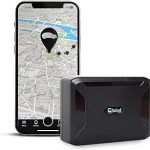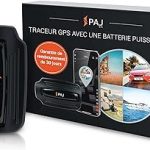

What is a GPS tracker?
![]() A GPS tracker, short for Global Positioning System, is a technological device or application designed to track and determine the precise geographic location of an object, person, or vehicle in real time. These trackers operate using a network of satellites orbiting the Earth, whose signals are captured and interpreted by the GPS tracker to calculate and display the current position. This technology offers remarkable accuracy, often down to a few meters.
A GPS tracker, short for Global Positioning System, is a technological device or application designed to track and determine the precise geographic location of an object, person, or vehicle in real time. These trackers operate using a network of satellites orbiting the Earth, whose signals are captured and interpreted by the GPS tracker to calculate and display the current position. This technology offers remarkable accuracy, often down to a few meters.
The usefulness of GPS trackers is vast and diverse, covering many situations in everyday life and work. Here are some of the cases where a GPS tracker can be extremely useful:
- Vehicle safety: GPS trackers are often used to track vehicle movements, which can be crucial in the event of theft or to optimize corporate fleet management.
- Property security: They help monitor and protect your valuable assets, such as your camping gear, sports equipment, or even your pet.
- Safety of loved ones: GPS trackers can ensure the safety of children, the elderly or people with special tracking and assistance needs.
- Outdoor activities: For those who enjoy hiking, climbing, mountain biking and other outdoor activities, a GPS tracker can help prevent loss and emergency situations.
- Navigation : GPS apps in smartphones are a common form of GPS tracker for road navigation, allowing drivers to find their way easily.
A GPS tracker is a versatile technological tool that offers the ability to accurately locate objects, people or vehicles, improving safety, management and peace of mind in many situations of daily life and work. In the following sections, we will explore in detail how GPS trackers work, the different types available on the market, as well as the criteria to consider when choosing the best GPS tracker according to your specific needs.
How does a GPS tracker work?
A GPS tracker works by using the Global Positioning System (GPS) to determine and transmit the precise geographic location of an object, person, or vehicle in real time. Here’s a more detailed explanation of how it works:
- Reception of satellite signals: A GPS tracker receives signals from multiple GPS satellites orbiting the Earth. These signals contain precise timing information.
- Calculating the distance: The GPS tracker measures the time it takes for signals to reach Earth. Using this information, it calculates the distance between itself and the satellites.
- Triangulation : By receiving signals from multiple satellites (at least three), the GPS tracker can triangulate to determine its own exact position. Each satellite sends time-stamped signals, which allows the tracker to calculate the travel time and therefore the distance between itself and each satellite.
- Position calculation: Using the distances calculated from three or more satellites, the GPS tracker determines its precise latitude, longitude, and altitude. This data is then typically displayed on a map or in an app.
- Data transmission: The calculated position is then transmitted to a central server via a communications network (usually cellular or the Internet) so that the user can access the location information remotely, often via a mobile app or website.
There are different types of GPS trackers, including standalone devices that come with their own battery, trackers that plug into a vehicle, and mobile apps that turn a smartphone into a GPS tracker. Each of these types has its own pros and cons in terms of portability, battery life, and accuracy.
Ultimately, the operation of the GPS tracker relies on the accuracy of the data provided by GPS satellites, making it a powerful tool for tracking real-time location in a variety of contexts, from vehicle security to asset monitoring and personal navigation.
What types of GPS trackers are available on the market?
On the market, you will find several types of GPS trackers, each adapted to specific needs. Here is an overview of the main types of GPS trackers available:
- Personal GPS Trackers: These small wearable devices are perfect for tracking personal items like backpacks, bikes, or pets. They are self-contained, easy to carry, and can be attached to a variety of objects.
- GPS Trackers for Vehicles: Designed for automotive security and fleet management, these trackers are often installed in vehicles. They offer extended battery life and are ideal for tracking the movements of cars, trucks or corporate fleets.
- GPS Tracker Mobile Applications: There are many mobile apps that turn your smartphone into a GPS tracker. They are convenient and affordable, but they rely on your phone’s battery and may be less accurate than dedicated devices.
- GPS trackers for pets: Specifically designed for pet safety, these trackers are lightweight and attached to the pet’s collar. They allow owners to track their pets in case they run away.
- Hiking GPS Trackers: These plotters are designed for outdoor enthusiasts. They are designed to withstand harsh conditions and offer specific features such as topographic maps.
- GPS Trackers for Health: Used to track physical activity and health, these devices can record jogging routes, activity levels, and other health data.
- GPS trackers for children and the elderly: They ensure the safety of children and the elderly by allowing parents or caregivers to monitor their movements.
- Industrial GPS Trackers: Used in the industrial sector to track valuable assets, equipment and vehicles, these trackers are robust and offer advanced asset management.
Choosing the type of GPS tracker depends on your specific use, whether it’s personal safety, asset management, or outdoor navigation. Each of these types of trackers has its pros and cons, so it’s important to choose the one that best suits your needs.
The 5 GPS Tracker Brands to Know
- Garmin
- Tile
- Spytec
- Thracian
- Invoxia
Benefits :
- Precision, durability, many features.
Disadvantages:
Garmin is a leader in the GPS tracker industry, offering a full range of options for outdoor enthusiasts and professionals.
Benefits :
- Compact, affordable, research community.
Disadvantages:
Tile is known for its Bluetooth trackers, which are great for keeping tabs on your personal items.
Flagship product : Spytec GL300.
Benefits :
- Small size, long battery life, precise tracking.
Disadvantages:
- Monthly subscription required.
Spytec is a popular option for vehicle tracking and personal security.
Benefits :
- Global tracking, customizable alerts.
Disadvantages:
- Monthly subscription required.
Tracki offers worldwide coverage for tracking your assets.
Benefits :
- Long distance tracking, no subscription.
Disadvantages:
Invoxia offers a subscription-free option for long-distance tracking.
Criteria for Choosing a GPS Tracker
When looking for the best GPS tracker, consider the following criteria:
- Location accuracy.
- Battery life.
- Ease of use of the application.
- Customizable alert options.
- Total cost including subscriptions.
Alternatives to GPS Trackers
![]() In addition to traditional GPS trackers, there are several alternatives to consider depending on your specific needs:
In addition to traditional GPS trackers, there are several alternatives to consider depending on your specific needs:
- Technology Bluetooth : Bluetooth beacons, like Tile products, can help you find lost items within close range using your smartphone’s Bluetooth technology.
- Balises RFID : Radio-Frequency Identification (RFID) tags are used for short-range object tracking and are commonly used in logistics and inventory management.
- Phone Tracking Apps: Phone tracking apps, such as “Find My iPhone” for Apple devices, offer phone tracking features in case your phone is lost or stolen.
- Camera surveillance systems: For home or office security, camera surveillance systems can be used to track activities in real-time.
- Asset Management Applications: Businesses use asset management applications to track the location of their assets and equipment.
Each alternative has its own advantages and limitations in terms of range, accuracy, and application. The choice will depend on the situation and the specific tracking needs you have in mind.
Conclusion
In short, choosing a GPS tracker depends on your specific needs. Brands like Garmin, Tile, Spytec, Tracki, and Invoxia offer diverse options to suit a variety of usage scenarios. Be sure to consider the essential criteria before making your choice.
FAQ
What is the average price of a GPS tracker?
Depending on the model, buying a GPS tracker can cost you an average of 60 euros. However, advanced models can easily reach the price of 700 euros.
What to do in case of vehicle theft?
If your vehicle is stolen, all you need to do is activate your GPS tracker from your smartphone. This way, you can follow its trajectory in time.
Is it legal to use a GPS tracker?
Absolutely! To this day, it is perfectly legal to equip your vehicle with a GPS tracker, whether for personal or professional reasons.
Other topics in the High-tech category
Similar topics
Ever-Growing GmbH is legally responsible for this content. The planning and creation of the content is carried out under the supervision of and in close cooperation with the BFMTV shopping team. Control over the decisions regarding the choice of content topics lies with the BFMTV shopping team, which is independent of the BFMTV.com editorial team.
